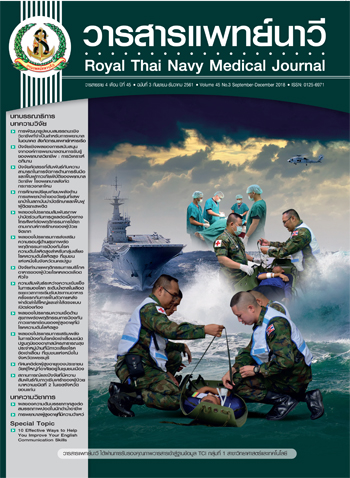The Effect of Health Belief Model Program on Complication Preventive Behavior in Hypertensive Older Persons
Main Article Content
Abstract
This study is quasi-experimental research with an aim to examine the effects of a health belief model program on complication preventive behavior in hypertensive older persons. The Health Belief Model developed by Strecher and Rosenstock was employed as the intervention. The target group was 50 elderly people with hypertension at the Elderly Club of Amphoe Wiset Chai Chan, Angthong, who met the eligibility criteria. The first 25 subjects were assigned to the control group and the next 25 subjects were assigned to the experimental group. They were pair-matched based on their similar characteristics in terms of gender, age, and educational attainment. The control group received routine nursing care, whereas the experimental group participated in the health belief model program for elderly people with hypertension. The research instrument was the health belief model program for complication preventive behavior in hypertensive older persons. The program consisted of a program implementation guide, a handbook of concepts and facts that elderly people with hypertension should know to prevent complications of hypertension, which were reviewed by five content experts to check content validity. The data were collected using the “Health behavior to prevent complications from hypertension” questionnaire which had a content validity index (CVI) of 0.85 and an acceptable reliability at 0.84. The data were analyzed and presented using descriptive (mean, percentage, and standard deviation) and t-test statistics.
The research results can be summarized as follows :
1. Complication preventive behavior in hypertensive older persons after participating in the health belief model program was better than that of before participating in the program with statistical significance at .05.
2. Complication preventive behavior in hypertensive older persons participating in the health belief model program was better than that of receiving routine nursing care with statistical significance at .05.
Recommendations should apply the health belief model program to older persons with hypertension in context in each responsible area for encouraging change in complication preventive behavior from hypertension.
Article Details

This work is licensed under a Creative Commons Attribution-NonCommercial-NoDerivatives 4.0 International License.
References
Wang A, An N, Chen G, Li L, Alterovitz G. Predicting hypertension without measurement: a non-invasive, questionnaire-based approach. Expert Systems with Applications 2015;42(21):7601-9.
Potts, K. Hypertension in older people: assessment and management. Nursing and Residential Care 2014;16(3):146-9.
Seow LSE, Subramaniam M, Abdin E, Vaingankar JA, Chong SA. Hypertension and its associated risks among Singapore elderly residential population. Journal of Clinical Gerontology and Geriatrics 2015;6(4):125-32.
Bureau of Non Communicable Diseases. Annual report 2014. Bangkok: WVO Thai Printing: 2014. (in Thai).
Medical Research Institute and Department of Medical Technology Assessment, Ministry of Public Health. Fact sheet: diabetes, hypertension, and their complications; the current situation in Thailand 2014. [cited 2014 April 28]. Available from: http://www.dms.moph.go.th/ imrta/images/data/ doc_dm_ht.pdf.
Rosenstock IM. The health belief model and preventive health. Health Education Monographs 1974;2(4):354-86.
Joint National Committee VII. The 1988 report of the Joint National Committee on detection, evaluation and treatment of high blood pressure. Arch Intern Med 2003;148:102.
Chaikul C. Effects of self-management and family participation enhancing program on health behavior and blood pressure among elderly with hypertension. [Master’s Thesis, Faculty of Nursing]. Prince of Songkla University; 2014. (in Thai).
Romano V, Scott I. Using health belief model to reduce obesity amongst African American and Hispanic populations. Procedia-Social and Behavioral Sciences Volume 2014;159(23):707-11.
Khongchoom P. Factors predictive complication prevention behaviors among hypertension patients of Prankratai Hospital, Kamphaengphet Province. [Master’s Thesis, Faculty of Public Health]. Naresuan University; 2010. (in Thai).
Khrutmuang W. Factors predicting health promoting behaviors among the elderly with hypertension. [Master’s Thesis, Faculty of Nursing]. Chiang Mai University; 2004. (in Thai).
Theangdunthia D. An application of the transtheoretical model to promote behaviors against complication among essential hypertensive patients in the hospital for tropical diseases. [Master’s Thesis, Faculty of Science]. Mahidol University; 2001. (in Thai).
Srangthaisong D. Supportive factors and barriers to exercise behaviors of elderly: a focus- group qualitative study. [Master’s Thesis, Faculty of Nursing]. Chulalongkorn University; 2006. (in Thai).
Jadjeen S. Health behavior and health status of elderly in Ban Oomlong Community, Thoen District, Lampang Province. [Master’s Thesis, Faculty of Science]. Chiang Mai University; 2012. (in Thai).
Strecher VJ, Rosenstock IM. The health belief model. In Glanz K, Lewis FM, Rimer BK, editors. Health behavior and health education: theory, research, and practice. 2nd ed. San Francisco: Jossey-Bass; 1997.
Burn N, Grove SK. The practice of nursing research: conduct, critique, utilization. 5th ed. St. Louis, MO: Elsevier Saunders; 2009.
Makpasook W. The effect of the protection motivation program on self care behavior in preventing complications among high risk hypertensive elderly. [Master’s Thesis, Faculty of Nursing]. Chulalongkorn University; 2008. (in Thai).
Chansuparin W. An application of the protection motivation theory and social support in modifying preventive behaviors against complications of essential hypertensive patients attending Lerdsin General Hospital. [Master’s Thesis, Faculty of Science]. Mahidol University; 2001. (in Thai).
Singthong P. The application of Self-Efficacy Theory for developing prevention behavior against complications of hypertension patients in Chaoprayayommaraj Hospital, Suphanburi Province. [Master’s Thesis, Faculty of Science]. Mahidol University; 1998. (in Thai).
Rosenstock IM. Model of individual health behavior. In Glanz K, Lewis FM, Rimer BK, editors. Health behavior and health education: theory, research and practice. San Francisco: Jossey-Bass Publishers; 1990. p. 33-62.
Katz DA. Health beliefs toward cardiovascular risk reduction in patients admitted to chest pain observation units. Acad Emerg Med 2009;16(5):379-87.
Jariyatanakhun J. The effects of health promotiong behavior program by applying the health belief model theory on preventing hypertension in the high risk elderly people. [Master’s Thesis, Faculty of Public Health]. Mahasarakham University; 2011. (in Thai).
Benjathanyaluk S, Kluenkaew N. Self-care behaviors of hypertensive patients by family and community participation. North-Eastern Primary Health Care Journal 2007;22(4):44-5. (in Thai).


